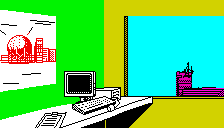Aftershock
Interceptor, £9.99

Eye, eye, no sooner do I mention the old Banner/Interceptor gang in the August editorial than, lo and behold, up they pop after a year spent in the wilderness. Well all I can say is welcome back, all is forgiven, and don’t get too worried about this review — after a year of Quilled games anything that isn’t Quilled immediately gets pride of place these days.
David M Banner first worked with Interceptor on Message from Andromeda (CRASH Aug 84) noteworthy for its fast machine code response, silent key entry, lack of cursor, pernickety vocabulary, and good graphics which, already residing in memory, were quickly drawn. Apart from the improvement in graphics demanded by all games purchasers, very little changed through Forest at World’s End (Nov 84), Jewels of Babylon (Feb 85) and Warlords (Sep 85), (these last two with Terry Greer).
Warlords had particularly short location descriptions but shared the series’ distinction in needing prepositions with the input while all other adventures had coalesced down to a verb/noun understanding. The poor EXAMINE command was as constant as the price: £5.50. The review of Jewels of Babylon caused a stir in the Interceptor camp because they assumed the impressive graphics alone warranted a good review whereas I saw my task as to review the game as an adventure; after all, anyone could look at the screen shots and make their own minds up about the quality of the pictures (and they were, indeed, super). A criticism I made which now looks dated was that aimed at all these games using the same system with apparently no room for improvement. Dated now because that was a time when innovation and improvement were the name of the game (as in arcades) but the invention of The Quill put paid to any hopes of adventuring breaking new ground consistently. So now the tables have turned, and games like those from Interceptor are very much welcomed.
Having said all that, this latest release ending the year’s hiatus, does actually improve the old system as here the text does not fly off the top of the screen on fresh input along the bottom so that all is readable in a very reasonable fashion. The pictures, so attractive in Jewels and Warlords, are almost as impressive. The story is probably the best in the series recounting the aftermath of a huge earthquake which rocks a city whose very heart straddles the faultline. The experts had only predicted minor rumbles for years but an underground nuclear test in the desert to the east activated the fault with dire results. Horrifying though the destruction to the city might be, it is its effects on the nuclear installation, for which you are responsible, that poses your immediate problems.
Having helped design the station you realise the importance of the failure of the coolant backup system before the earthquake, but now the quake has occurred, and you have been informed of the primary cooling system losing pressure and workers losing nerve. The urgency for you to escape your damaged office area and make your way to the reactor becomes all too clear. The fault has been traced to a switching valve in the backup system and you’re the man whose job it is to ensure the valve works and the reactor is contained.
Playing Aftershock will be made much easier if you remember how this game’s series often prefers you to be wordy with your input, with prepositions and so on sprinkled liberally for good measure. The first difficulty is met after only six locations. A chair, a pen and radio are picked up, along with some tissues from the washroom. The lift is inoperative and the stairwell from your office is filled with smoke and flames. It becomes pretty obvious that the chair is used somehow to escape and this is soon achieved if the program’s propensity for long, exact sentence structure is remembered. After the claustrophobia of the first six locations the program runs wild with you being able to wander a great many locations without pausing for thought. Pause for thought you eventually must, however, when diverse objects are met: fruit and meat vie with the likes of diamonds and a television set, all looking for a problem as a home to settle in. The food is found just outside the zoo, home of lions, bears, reptiles, insects, and an elephant on a ramp. Something tells me there’s a problem here somewhere, I wonder if you can spot it? One timely tip about this game — get into the habit of searching the artefacts of areas and don’t just rely on the bottom line which tells of any obvious objects present. In this way you’ll unearth even more objects looking for a problem to solve! On the technical side this program runs very well with instant high-res graphics and a sure-footed (if silent) entry system.
There’s some confusion over who produced the fine graphics on this one: Robin Chapman is credited on the inlay but Terry Greer is once again cited on the loading screen.
Aftershock is something special in these days of Quilled adventures. The storyline, and pictures which illustrate it, are really fine things to behold at a time when good new adventures are thin on the ground. If you hanker for the days when adventures were stimulating, thought-provoking and imaginative, have a look at this one, and fill a large black refuse sack with all the Quilled clones released, because that’s what I’ve done.
COMMENTS
Difficulty: once vocabulary is grasped progress becomes easier
Graphics: a few locations, very crisp and clear
Presentation: Spectrum character set but overall alright
Input facility: well beyond verb/noun, and v/n often not good enough on their own
Response: very fast
General rating: a quality, traditional, adventure
| Atmosphere | 89% |
| Vocabulary | 78% |
| Logic | 88% |
| Addictive quality | 91% |
| Overall | 89% |